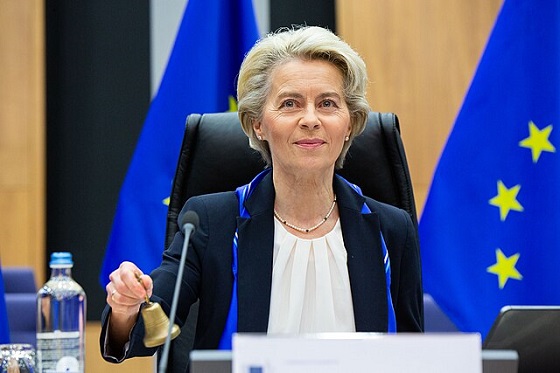International
EU preparing for war: President Von der Leyen proposes €800 billion plan to re-arm Europe

 MxM News
MxM News
Quick Hit:
European Commission President Ursula von der Leyen unveiled an ambitious “Rearm Europe” plan on Tuesday, proposing up to 800 billion euros ($870 billion) in funding to bolster EU defense and provide emergency aid to Ukraine. The proposal comes ahead of a crucial European summit on security and military preparedness.
Key Details:
- Von der Leyen’s plan outlines five funding options, including budget flexibility for defense spending and redirected loans.
- 150 billion euros in loans would be used for missile defense, ammunition, and drone capabilities.
- The European Investment Bank and private capital mobilization are also proposed to finance the initiative.
Diving Deeper:
With Russia’s war on Ukraine dragging into its third year, Ursula von der Leyen is pushing to accelerate Europe’s military preparedness. On Tuesday, the European Commission president unveiled a massive “Rearm Europe” initiative, seeking to mobilize up to 800 billion euros to strengthen the continent’s defense capabilities. The plan is aimed not only at sending further aid to Ukraine but also at ensuring the long-term military resilience of EU nations.
The announcement comes just two days before a critical European summit on Ukraine and regional defense, where EU leaders will discuss security measures in the face of escalating threats. In a letter to EU heads of state, von der Leyen outlined five main funding options to finance the rearmament effort.
Von der Leyen’s first proposal calls for granting EU member states budgetary flexibility, ensuring that their military expenditures do not count towards the bloc’s excessive deficit rules for four years. This means countries could increase defense spending without violating EU budgetary constraints.
The plan includes reallocating 150 billion euros in existing EU loans to fund key military capabilities, such as air defense, missile systems, ammunition, and drones. This would boost interoperability across Europe’s armed forces and enhance collective security.
A controversial aspect of von der Leyen’s proposal involves allowing member states to redirect EU cohesion funds—originally meant for economic development in poorer regions—towards their defense policies. This could face pushback from countries that rely on those funds for infrastructure and social programs.
The fourth component seeks to leverage private investment by accelerating the formation of a European savings and investment union, encouraging private entities to fund defense projects.
Lastly, the Commission proposes using European Investment Bank (EIB) programs to help finance Europe’s defense sector, providing an additional stream of capital.
Von der Leyen’s proposal reflects a major shift in EU defense policy, as the bloc moves toward a more militarized and self-reliant security strategy. However, securing agreement from all 27 EU member states will be a challenge, particularly when it comes to redirecting economic funds toward military spending.
“Ursula von der Leyen 2022” by European Commission licensed under CC BY 4.0 DEED.
International
Germany launches first permanent foreign troop deployment since WW2

 MxM News
MxM News
Quick Hit:
Germany activated a 5,000-strong armored brigade in Lithuania — marking its first permanent foreign military deployment since World War II. The move strengthens NATO’s eastern flank amid Ukraine’s ongoing conflict with Russia.
Key Details:
- The 45th Armored Brigade was formally launched outside Vilnius on Tuesday.
- Germany plans for the brigade to be fully operational by 2027 in Rūdninkai, near the Belarus border.
- The deployment marks a major policy shift for Berlin and a boost for NATO’s deterrence posture.
Diving Deeper:
Germany has officially entered a new era of military engagement, launching its first permanent foreign troop deployment since the end of World War II. The move, announced Tuesday, sees the activation of a 5,000-strong armored brigade in Lithuania as part of a broader NATO strategy to counter the perceived threat from Russia.
The newly formed 45th Armored Brigade was ceremonially inaugurated outside the Lithuanian capital, Vilnius. German Brigadier General Christoph Huber assumed command, overseeing the establishment of a temporary headquarters and unveiling the unit’s crest. “We have a clear mission: to ensure the protection, freedom and security of our Lithuanian allies on NATO’s eastern flank,” Huber said, adding that the unit’s presence also directly contributes to the defense of Germany and NATO as a whole.
The deployment follows a pledge made by Berlin in 2023 — a decision that broke with decades of postwar defense policy rooted in military restraint. German officials had long avoided permanently stationing combat troops abroad. That posture has changed in response to Russia’s ongoing war in Ukraine, which has turned the Baltic region into one of NATO’s most vulnerable frontlines.
Germany’s commitment includes more than just fighting forces. The brigade will also feature key support elements, such as a medical center, communications specialists, and command support units dispersed across multiple Lithuanian locations. Troops will initially operate out of temporary facilities, with a permanent base under construction in Rūdninkai, located roughly 30 kilometers south of Vilnius.
Currently, 150 German soldiers are already on the ground in Lithuania. That figure is expected to rise to 500 by the end of the year as the new brigade scales up operations.
Censorship Industrial Complex
China announces “improvements” to social credit system

 MxM News
MxM News
Quick Hit:
Beijing released new guidelines Monday to revamp its social credit system, promising stronger information controls while deepening the system’s reach across China’s economy and society. Critics say the move reinforces the Communist Party’s grip under the banner of “market efficiency.”
Key Details:
- The guideline was issued by top Chinese government and Communist Party offices, listing 23 measures to expand and standardize the social credit system.
- It aims to integrate the credit system across all sectors of China’s economy to support what Beijing calls “high-quality development.”
- Officials claim the new framework will respect information security and individual rights—despite growing global concerns over surveillance and state overreach.
Diving Deeper:
China is doubling down on its social credit system with a newly issued guideline meant to “improve” and expand the controversial surveillance-driven program. Released by both the Communist Party’s Central Committee and the State Council, the document outlines 23 specific measures aimed at building a unified national credit system that will touch nearly every corner of Chinese society.
Framed as a tool for “high-quality development,” the guideline declares that credit assessments will increasingly shape the rules of engagement for businesses, government agencies, and individual citizens. The system, according to the National Development and Reform Commission (NDRC), has already played a role in shaping China’s financial services, government efficiency, and business environment.
Critics of the social credit system have long warned that it serves as an instrument of authoritarian control—monitoring citizens’ behavior, punishing dissent, and rewarding obedience to the Communist Party. By integrating credit data across all sectors and enforcing a “shared benefits” model, the new guideline appears to entrench, not ease, the Party’s involvement in everyday life.
Still, Beijing is attempting to temper foreign and domestic concerns over privacy. The NDRC emphasized that the system is being built on the “fundamental principle” of protecting personal data. Officials pledged to avoid excessive data collection and crack down on any unlawful use of information.
-

 2025 Federal Election1 day ago
2025 Federal Election1 day agoCanada Continues to Miss LNG Opportunities: Why the World Needs Our LNG – and We’re Not Ready
-

 International6 hours ago
International6 hours agoGermany launches first permanent foreign troop deployment since WW2
-

 COVID-192 days ago
COVID-192 days agoTrump’s new NIH head fires top Fauci allies and COVID shot promoters, including Fauci’s wife
-

 Freedom Convoy2 days ago
Freedom Convoy2 days agoFreedom Convoy leaders Tamara Lich, Chris Barber found guilty of mischief
-

 2025 Federal Election9 hours ago
2025 Federal Election9 hours agoPoilievre To Create ‘Canada First’ National Energy Corridor
-

 2025 Federal Election23 hours ago
2025 Federal Election23 hours agoMainstream Media Election Coverage: If the Election Was a NHL Game, the Ice Would be Constantly Tilted Up and to the Left
-

 Business2 days ago
Business2 days ago‘Time To Make The Patient Better’: JD Vance Says ‘Big Transition’ Coming To American Economic Policy
-

 2025 Federal Election2 days ago
2025 Federal Election2 days agoPoilievre promises to drop ‘radical political ideologies’ in universities






